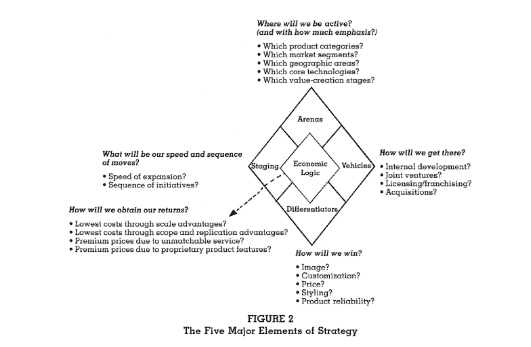Let’s be honest—strategy often gets a bad rap. It sounds like something locked behind boardroom doors, filled with buzzwords, frameworks, and overly complicated slides. But here’s a thought: what if strategy wasn’t as complex as people make it out to be? What if, instead, it was something you could actually use every day—simple, practical, and aligned with the real world of running a business? In this article, we’re going to break it down and show you how strategic thinking can be both clear and actionable—without the corporate jargon.

History Keeps Repeating Itself
If you ever picked up a history book about World War I or watched any of the numerous documentaries on the same subject broadcast by History Channel, maybe you came across the name of Douglas Haig, a British military commander who led the British forces during WWI.
It was the summer of 1916, when, to take some pressure off the French troops that were fighting off the Germans at Verdun, the British decided to attack the Germans North of the River Somme.
There, under the command of Sir Haig, the British Army bombarded the German defense for a full seven days. At the end of the seven days, on the 1st of July, thinking that the British projectiles would have already annihilated a substantial fraction of the opposition, Haig ordered his men to advance into ‘no man’s land’ and launch an attack on the enemy.
Sadly, Sir Haig had been wrong in his supposition. Unlike the shallow British trenches, the German trenches were deep and had kept the German soldiers sheltered from the British shells.
So, as the Brits were slowly advancing toward the enemy through ‘no man’s land,’ weighed down as they were by their heavy equipment, the Germans had plenty of time to leave the trenches, install their machine guns, and start firing at the Brits.
What followed was a full-on slaughter. About 20,000 British men died almost immediately, and, by the end of the day, Haig had lost a total of 60,000 men – the highest death toll recorded in one day in the entire history of the British Army.
By the end
By the end of the battle, the British Army had lost about 420,000 men, and Field Marshal Haig became known as one of the most incompetent generals to have led an army into battle during World War I. Public opinion blamed his obtuse thinking and lack of vision for the pointless killing of hundreds of thousands of British men.
Why am I telling you this story?
Hold on. I haven’t finished it yet. There’s one more thing I’d like to add about Sir Douglas Haig.
You see, when people hear words like vision, planning, and strategy, they often imagine something overly complicated—something that requires genius-level brainpower or an MBA to decode. But here’s the truth: it doesn’t have to be that way. In fact, what if strategy wasn’t as complex as it’s made out to be? What if it was just about clarity, priorities, and making consistent decisions that move you forward?
The Battle of the Somme might have been less costly for the British had they taken the time to look at the details and come up with an adequate plan.
But they overlooked the most obvious facts. Sir Haig didn’t know how deep and secure the German trenches were. He didn’t realize that the British projectiles wouldn’t cut through the barbed wire protecting the German defense, and he didn’t think that it would take his men longer to reach the Germans than it would take Germans to reach their machine guns.
Strategy, regardless of whether we’re talking about business or warfare, is about looking at the facts, understanding context, knowing where you are, where you want to get, and how you’re going to get there.
Business Is War Without Bullets
Wait, what?
Let me explain this. As a business owner, you don’t have one “enemy”. However, you have tens or hundreds of competitors. And you have to beat them on many business fronts: marketing, sales, product quality. It all seems so complicated that it’s taking away the pleasure of being an entrepreneur.
And, just like it is with any battle, engaging in this kind of “war,” bulletless as it may be, can cost you dearly. Nevertheless, at least, you know what to expect. The dangers of entrepreneurship are evident. What’s not so evident, and thus far more deadly than the risks of starting a business, is the set of potential challenges that your business idea may carry.
Most entrepreneurs I know were so enamored with their business ideas when they first started out that they couldn’t see any flaws. And when you can’t recognize the potential roadblocks ahead, you won’t know how to prepare for them. But what if strategy wasn’t as complex as trying to predict every possible outcome? What if it simply meant asking the right questions early—and being honest with the answers?
For your business, there’s something even deadlier than war.
Falling in Love Can Be Deadly
You probably know about Romeo and Juliette and how they died because of their complex love affair. But I’m not talking here about that kind of love. It’s a different one.
Do you even remember how it all started and how enthusiastic you were when you first realized you had come up with that brilliant business idea?
It wasn’t something that you had planned on doing. It probably happened almost naturally.
Most of the entrepreneurs I talk to have similar stories: they were casually talking to one of their friends about a product they had bought when the friend started complaining about that product.
Perhaps that was your case, too. Maybe your friend was saying that not only did that product cost him a fortune, but that it didn’t even work as advertised. It was slow, and it crashed every other day. Not to mention that it would have been much helpful had it had this extra feature that no products seemed to have at that moment.
And as your friend was expressing his frustration, you were thinking: “Hm… I bet it wouldn’t be too hard to add that feature this guy needs.”
Then you went online—on the same tech forums you usually browse—and suddenly started noticing something: more and more people were asking whether anyone knew of products or tech solutions with the exact features your friend needed. It made you wonder—what if strategy wasn’t as complex as forecasting the future, but as simple as paying attention to patterns already forming around you?
From Frustration to Infatuation
And that’s when you went: “You know what? That’s it! I can build a business here.” That’s when you fell in love with your business idea.
But just like lovers are blind to the quirks of their beloved, so, too, is the entrepreneur blinded by the love they have for their business idea, and failing to see the reality of this love.
Love Hurts
And just like when you first fall in love with another person, and you feel like you’re living in a dream, when you first fall in love with a business idea, you start living in your imagination.
You miss the facts, the reality, just like British Field Marshal, Douglas Haig, who fell in love with his idea and completely missed the reality of the situation.
And if you’re anything like most of the solo entrepreneurs I know, you were probably so blind to your beloved business idea’s downsides and difficulties that you’ve tried doing everything on your own.
And so, you set out to build your product, plan your marketing, and manage your sales, all by yourself.
When Passion Blinds Strategy
You thought getting the product out the door would be the hardest part, but it wasn’t. Although it took you quite a while to get everything done – what was about to follow was going to be even more difficult.
You knew you had to market the product somehow. You’d heard that paid advertising was all the hype, so you decided to give it a shot. You read up on how it works, then told yourself, “How hard could it be?” You picked a few keywords that seemed relevant and designed your ads as best you could. But what if strategy wasn’t as complex as chasing trends or guessing your way through campaigns? What if it started with understanding your audience before choosing your tools?
But there were so many options to choose from in your Google Ad Manager platform that it would have taken you days on end to figure out what each one of them was supposed to do. So you figured you should leave Google Ads to the experts and give that one up.
Then, you thought that maybe you could handle the SEO instead, and you started reading articles on how to optimize your website pages. You managed to do some link-building yourself, but the results were insignificant.
And this was just the marketing.
Sales-wise, you were probably thinking at that time: “This service of mine is so useful and so adaptable, that I could work for any industry and serve any company size. I could work with both the mom-and-pop stores in my town and with some of the Fortune 500 companies worldwide.”
It’s Not Strategy That’s Complicated—It’s the Absence of One
But the reality couldn’t be more different.
People would keep saying things like: “Yeah, your product is alright, but it’s not something that I’m considering right now. Maybe I’ll get back to you sometime in the future.”
“Buuut it’s exactly for you!” you would think as you were watching yet another client shrugging and slowly walking away. You knew this is for them. But your sales were nowhere near what you had expected them to be when you first started this business.
And now, when I’m coming to tell you that strategy doesn’t have to be complicated, you’ll probably roll your eyes at me and relive all of these experiences that you’ve had with marketing, sales, and everything else.
But here’s the catch: you’re looking at it from the wrong angle. It’s not the strategy that’s complicated. It’s the lack of a robust strategy that makes marketing, sales, operations, support, and everything else to be very complicated.
Why Is Strategy So Complicated—What If Strategy Wasn’t as Complex?
To answer this question in one sentence: people confuse strategy with tactics.
If you’ve scheduled a meeting to discuss strategy with your team, but then everyone starts talking about tools, details, and specifics, then you’re not talking strategy.
People often confuse strategy with tactics. So when a conversation about strategy gets filled with subtleties, nuances, and layers of buzzwords, it’s no surprise you end up thinking, “Why is everyone making strategy so complicated?” But what if strategy wasn’t as complex as everyone makes it seem? What if the real challenge was just stepping back to see the bigger picture—clearly and simply?
Ok, then, what is strategy?
Without going to a dictionary, essentially, a strategy is a hypothesis. If I perform this action, then I expect this other result to occur.
And the good news is that strategy doesn’t need to be complicated. All you need to simplify it is to think about it within a logical framework.
Now, there’s one thing I’d like to add to this. There are some people out there who like to make strategy complicated on purpose, as they believe it would make things more interesting.
But if you do not share their belief, then things can be much simpler than you imagine. You don’t need an army of people to come up with a functional strategy.
All you need is a logical framework within which to build your hypotheses. 👇
Strategy 101: What If Strategy Wasn’t as Complex as a Board Game?

Before I get to the technical parts of the framework that I just mentioned, let me tell you what your frame of mind should be when thinking about strategy.
Basically, this is what you should ask yourself: “Where am I going to play, and how am I going to win?”
Think of it as if it were a board game. What do we all do when it’s the other player’s turn to move on the board?
Well, we all think about what we’re going to do next. We analyze our opponent’s position on the board and think of ways to move past him and win.
It’s the same with strategy.
Your “where,” so to speak, is your target market. To define it, you can use the jobs to be done framework that we’ve talked about in our most recent article, and focus on answering this one question: What job to be done do you want to fulfill?
Once you’ve determined the “where,” you can move on to the second part of the question and answer the “how.” In other words, how are you going to win at this game called business?
Why would people buy from you? Why are you better than the competition? What makes your product—or your brand—stand out? These are big questions, but what if strategy wasn’t as complex as crafting the perfect pitch, and instead started with simply understanding and communicating your unique value clearly?
Unless you have a compelling answer to these questions, neither your competitors nor the consumers will let your business be profitable. Buyers won’t notice you, and, subsequently, the competition will push you out of the market.
That’s why you need a killer STRATEGY.
Approach Business Strategy as if It Were a Board Game and Win!
[Everything You Need to Know About the Strategy Diamond Framework]

The truth is that every entrepreneur approaches business strategy in their own unique way. That depends on what definition of strategy they prefer to use and what strategic tools they have available.
We like to think of entrepreneurship as if it were a board game
The crucial thing to keep in mind is that, just like with any board game, if you want to play, you need to choose your game carefully. What if strategy wasn’t as complex as mastering every rule, but simply choosing the right game for the outcome you want?
Before making a decision, make sure to consider the game’s potential, the rules of the game, and your chances of winning.
And this gets us to the next point – the strategy diamond model, developed by the academics Donald C. Hambrick and James W. Fredrickson – a model that embodies this board game mindset.
According to the diamond framework, a strategy has five main elements, each posing one essential question:
- Arenas – Where are you going to compete?
- Vehicles – How will you get there?
- Differentiators – How will you win in the marketplace?
- Staging – What will be your speed and sequence of moves?
- Economic logic – How will you obtain your returns?
This framework comes as a solution to our current situation. What we have right now is a majority of executives operating with “strategic threads” instead of complete, coherent strategies. Unfortunately, all this approach does is create confusion and tarnish their credibility.
Here you have a visual representation for the diamond model:

Source: The Academy of Management Executive, Vol. 19, No. 4, Nov. 2005.
The Diamond Model
We’ll go through all five elements and tell you a bit about what each of them involves:
- Arenas – In order to delineate arenas, it’s essential to be as specific as possible about the product categories, market segments, geographic areas, and core technologies you intend to take on. You need to decide not only where your business will be active, but also how much you’d like to focus on each arena.
- Vehicles – If you choose to expand your product range, are you going to rely on organic, internal product development, or are there other vehicles – like joint ventures or acquisitions – that you might want to consider? If you are committed to international expansion, you need to get a clear picture of the vehicles you’re going to employ to achieve your goal – green-field startups, local acquisitions, licensing, or joint ventures.
- Differentiators – Having the best combination of differentiators can offer you a great marketplace advantage. Regardless of the differentiators you choose – image, customization, price, product styling, after-sale services, or others – it’s vital to make up-front, deliberate choices.
- Staging – There are several factors you need to consider when it comes to staging. Here’s what will come into play: resources (financial, human, informational), urgency (pursue brief windows of opportunity first), credibility (valuable for attracting resources and stake-holders), and the pursuit of early wins (start with what you know you can achieve, then deal with the more challenging or unfamiliar initiatives).
- Economic Logic – At the heart of any business strategy, you must place a clear plan regarding the mechanism based on which your business generates profits – not just some profits, but profits above the company’s cost of capital.
Focus on All 5 Aspects
As I mentioned in the beginning, here at our agency, we consider that the concept of jobs to be done should lie at the core of Economic Logic. That is because once you have defined your jobs to be done, you will have economic logic. In other words, you will know exactly how your business generates profit. Then, you can move on to take care of all the other elements in your strategy.
What’s important to remember is that strategy isn’t just a list of options in five different areas. It’s an integrated, mutually reinforcing set of choices—hypotheses, really—paired with the consequences we believe will follow. What if strategy wasn’t as complex as a rigid formula? But instead a thoughtful chain of cause and effect based on clarity and intent?
Surprisingly enough, most strategic plans out there emphasize just one or two of the elements we’ve discussed. And that without giving any consideration to any of the others.
Sadly, this omission seems to become visible only when the strategy that a company formulated doesn’t return the envisioned results.
Validate the Plan: What If Strategy Wasn’t as Complex After All?
Finally, you need to test the quality of the strategy you’ve just put together. In order to do that, here’s what you have to ask yourself 👇
- Does my strategy fit with what’s going on in the environment?
- Does my strategy exploit your key resources? With my particular mix of resources, does this strategy give me an advantage against my competitors?
- Will my differentiators be sustainable? Will competitors have difficulty matching me?
- Are the elements of my strategy internally consistent? Have I made choices of arenas, vehicles, differentiators, and staging, and economic logic that fit and mutually reinforce each other?
- Do I have enough resources to pursue this strategy? Do I have the money, managerial time and talent, and other capabilities to do all I want to achieve?
- Is my strategy implementable? Will my key consistencies allow me to follow this strategy?
All or Nothing—But What If Strategy Wasn’t as Complex as It Seems?

When you set off on a new journey, you usually take the time to gather the necessary information and make all the arrangements you need. In short, by making decisions regarding where you’re going to stay, what you’ll see, and so on, you create a strategy to help you enjoy that journey to the maximum.
Why should it be any different when you start a business?
A complete strategy is like a roadmap—it reveals what the future of your business could look like. In full detail. And what if strategy wasn’t as complex as people think? But simply a clear way to connect where you are now with where you want to go?
Key Takeaways
To wrap this up, let’s make sure you have the TL;DR:
- Unless you have a compelling strategy in place, everything else will be very hard, including marketing, sales, operations, and support.
- Start working on your strategy by identifying the job to be done. This will be the core of your strategy – your Economic Logic.
- Strategy requires constant iterations. So plan to implement, measure, adjust and repeat as often as needed.
At WPRiders, we have worked with hundreds of customers, helping them build their online platforms and formulate winning business strategies. More often than not, we find customers wanting to jump right into the work. And that without spending the time to develop the clarity that only a comprehensive strategy can offer.
The problem with that approach is this: if you don’t know the “why” behind your project and can’t clearly articulate what success should look like, it’s going to be hard to build an online platform that delivers on all fronts. But what if strategy wasn’t as complex as defining every detail upfront? And instead was about starting with purpose and letting that guide your decisions?
So, if you’re looking for a partner to help you formulate a compelling strategy, we do this daily. It’s our pleasure to partner with customers who are stepping up their strategic thinking when tackling all sorts of problems.
Bottom Line: What If Strategy Wasn’t as Complex After All?
At WPRiders, we know your website isn’t just a project—it’s part of your business engine ⚙️. That’s why we offer more than just code. From thoughtful WordPress custom development to dependable monthly WordPress maintenance, we’re here to support what matters most. Whether you’re planning a new build with custom WordPress website development 🛠️, looking for a reliable WordPress consultant 🧠, need and Elementor developer,or need ongoing support through our WordPress development service, we’d love to explore how we can work together.
If that sounds like what you need, 👉 Schedule a Free Discovery Call and let’s talk about your next move. We’re always up for a good conversation.
Further reading: How to Choose the Best WordPress Consultant for Your Business





